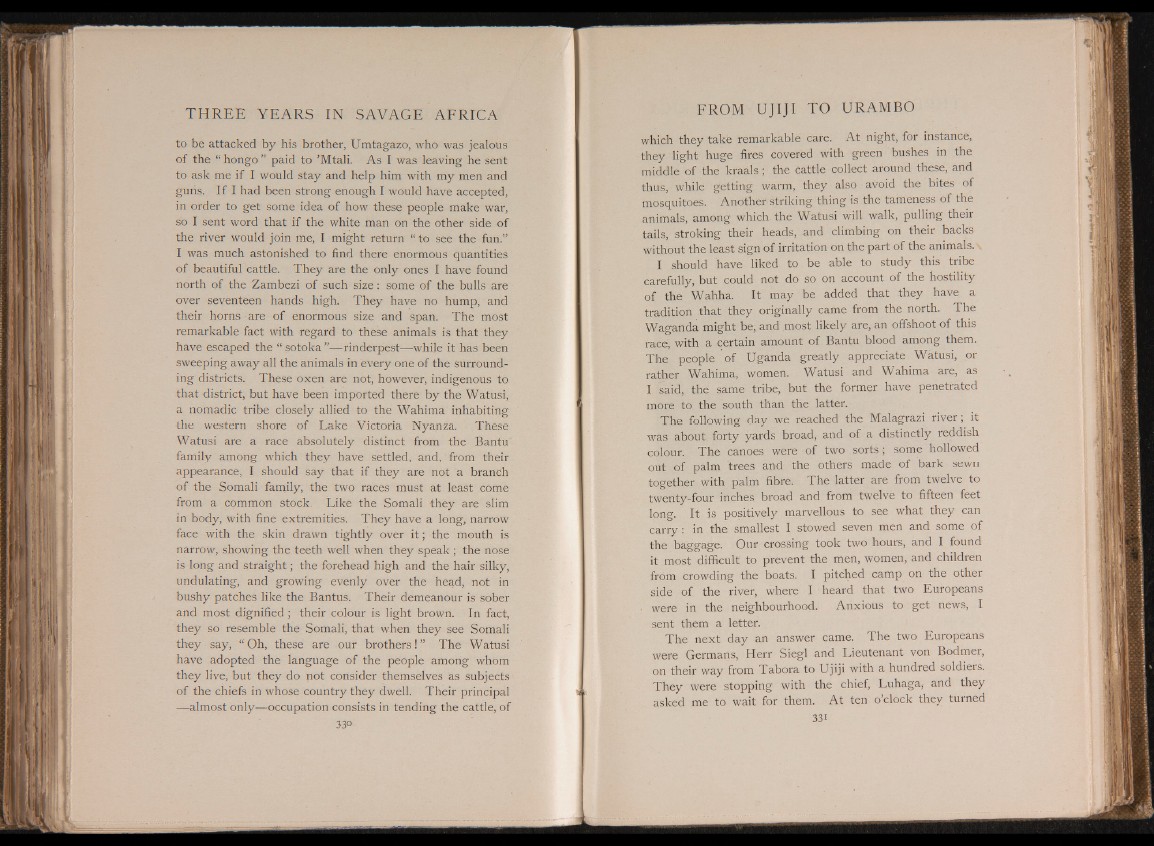
to be attacked by his brother, Umtagazo, who was jealous
of the “ hongo” paid to ’Mtali. As I was leaving he sent
to ask me if I would stay and help him with my men and
guns. I f I had been strong enough I would have accepted,
in order to get some idea of how these people make war,
so I sent word that if the white man on the other side of
the river would join me, I might return “ to see the fun.”
I was much astonished to find there enormous quantities
of beautiful cattle. They are the only ones I have found
north of the Zambezi of such size: some of the bulls are
over seventeen hands high. They have no hump, and
their horns are of enormous size and span. The most
remarkable fact with regard to these animals is that they
have escaped the “ sotoka”—rinderpest—while it has been
sweeping away all the animals in every one of the surrounding
districts. These oxen are not, however, indigenous to
that district, but have been imported there by the Watusi,
a nomadic tribe closely allied to the Wahima inhabiting
the western shore of Lake Victoria Nyanza. These
Watusi are a race absolutely distinct from the Bantu
family among which they have settled, and, from their
appearance, I should say that if they are not a branch
of the Somali family, the two races must at least come
from a common stock. Like the Somali they are slim
in body, with fine extremities. They have a long, narrow
face with the skin drawn tightly over i t ; the mouth is
narrow, showing the teeth well when they speak ; the nose
is long and straight; the forehead high and the hair silky,
undulating, and growing evenly over the head, not in
bushy patches like the Bantus. Their demeanour is sober
and most dignified ; their colour is light brown. In fact,
they so resemble the Somali, that when they see Somali
they say, “ Oh, these are our brothers! ” The Watusi
have adopted the language of the people among whom
they live, but they do not consider themselves as subjects
of the chiefs in whose country they dwell. Their principal
—almost only—occupation consists in tending the cattle, of
which they take remarkable care. At night, for instance,
they light huge fires covered with green bushes in the
middle of the kraals; the cattle collect around these, and
thus, while getting warm, they also avoid the bites of
mosquitoes. Another striking thing is the tameness of the
animals, among which the Watusi will walk, pulling their
tails, stroking their heads, and climbing on their backs
without the least sign of irritation on the part of the animals. \
I should have liked to be able to study this tribe
carefully, but could not do so on account of the hostility
of the Wahha. It may be added that they have a
tradition that they originally came from the north. The
Waganda might be, and most likely are, an offshoot of this
race, with a certain amount of Bantu blood among them.
The people of Uganda greatly appreciate Watusi, or
rather Wahima, women. Watusi and Wahima are, as
I said, the same tribe, but the former have penetrated
more to the south than the latter.
The following day we reached the Malagrazi river; it
was about forty yards broad, and of a distinctly reddish
colour. The canoes were of two sorts ; some hollowed
out of palm trees and the others made of bark sewn
together with palm fibre. The latter are from twelve to
twenty-four inches broad and from twelve to fifteen feet
long. It is positively marvellous to see what they can
carry: in the smallest I stowed seven men and some of
the baggage. Our crossing took two hours, and I found
it most difficult to prevent the men, women, and children
from crowding the boats. I pitched camp on the other
side of the river, where I heard that two Europeans
• were in the neighbourhood. Anxious to get news, I
sent them a letter.
The next day an answer came. The two Europeans
were Germans, Herr Siegl and Lieutenant von Bodmer,
on their way from Tabora to Ujiji with a hundred soldiers.
They were stopping with the chief, Luhaga,- and they
asked me to wait for them. At ten o’clock they turned
33i